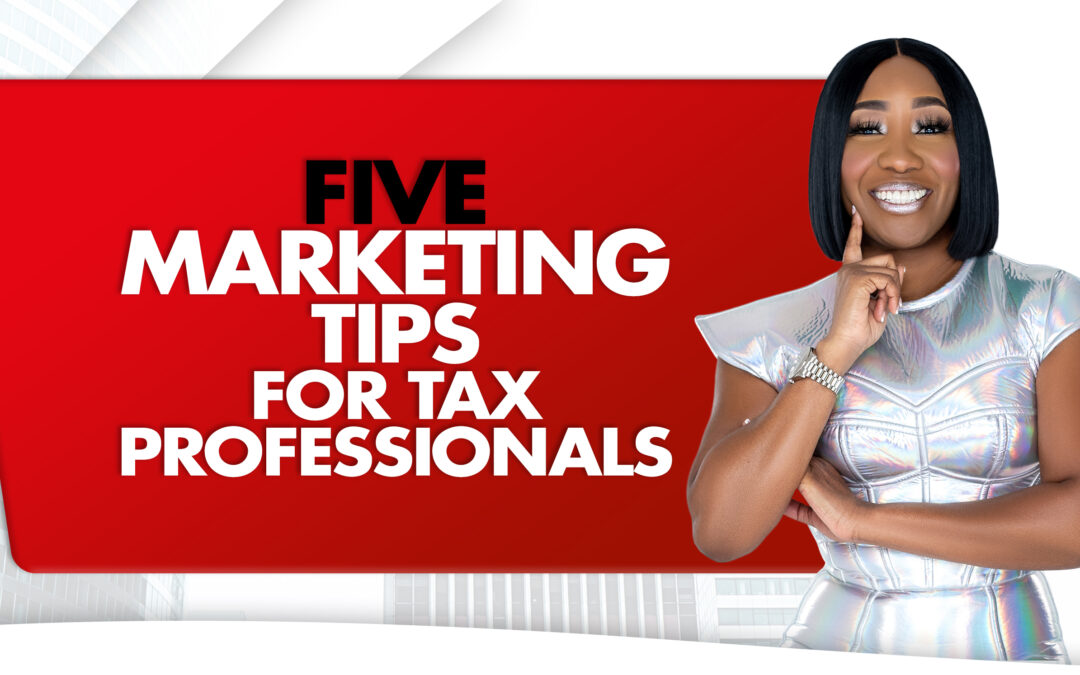The 2023 tax season is just months away—if you’re a professional tax preparer who hasn’t already, it’s time to start advertising your tax business. Knowing how to effectively market your company can be overwhelming, which is why I’ve compiled this list of proven marketing tips for tax professionals.
By implementing a clear and comprehensive marketing strategy for tax services, you’ll have plenty of qualified clients coming to you, and you won’t have to worry about your business’ performance.
…While you’re here, register for my exclusive FREE online training, ‘Teach Me The Tax Game’ to learn how to increase your income with a new career in the tax industry, and make $100K in just 90 days!
Tax Business Marketing Plan: When to Create One
The month or two leading up to April’s general tax filing deadline is often a busy time for tax professionals. This is a mistake.
By that time, many clients have already decided on a tax preparer and are not willing to switch providers.
When tax preparation season begins, you won’t have the time or mental space to create an effective marketing campaign, so it’s essential to focus on your marketing strategy ahead of time.
Not only that, with a year-round marketing plan, you’ll have a steady flow of clients and won’t have to scramble when you’re most busy. Remember, it’s ideal to start your marketing strategy in the fall. That’s so you can see what’s working, adjust accordingly, and start bringing in new clients before the next tax season.
Marketing Tips for Tax Professionals
1: Identify Your Target Audience
Determine who is in your target market for tax preparation business before considering marketing tactics. Since tax services are used for such a wide range of reasons, finding your right client profile will help your marketing reach the right people.
For instance, if you provide tax preparation services to small businesses, you should research where they spend their time–email marketing and LinkedIn posts and ads will likely be effective. But you won’t get the same results if you target middle-class taxpayers. That’s why it’s imperative to start by determining who you want to reach and what messages will resonate with them.
2: Search Engine Optimization (SEO)
SEO (search engine optimization) is one of the most effective marketing tips for tax professionals.
Sure, it can seem intimidating if you aren’t familiar with it. But ultimately, the concept boils down to ensuring that search engines and the people using them can easily find your tax business and choose it over a competitor.
An SEO strategy for tax professionals involves creating a user-friendly website that describes your services and approach to tax preparation in detail. To boost your SEO efforts, keep your website and content updated, and focus on technical SEO. Content marketing is an excellent way to do that, which I’ll discuss in more detail below.
3: Paid and Organic Social Media Marketing
Many traditional businesses, like tax preparers and professionals, are hesitant to use social media. However, it’s still important to invest in organic and paid content on at least one or two social media platforms to increase your brand awareness. To gain new clients, you don’t have to become a TikTok influencer, but you can create a professional LinkedIn presence or run Facebook ads.
Social media can also be a great source of marketing ideas for tax preparers and accountants. Check out what other tax professionals have created on the platforms where your clients spend time—copying is obviously bad business, but seeing how others in the field have come up with creative approaches can prove very valuable.
4: Reputation Management
If you’re a professional tax preparer, you need to have and maintain a trustworthy reputation. You handle some of the most personal information about your clients’ lives as well as their reputations and financial futures. To get the most results from your marketing, your online reputation must be impeccable.
You should at least set up your Google My Business profile and deal with any negative reviews there promptly. Be sure to share content that’s free of bias, hyperbole, or clickbait on any platform. In addition to being accurate and educational, it can also have personality and creativity.
5: Content Marketing
Many business owners underestimate the power of content marketing. For example, you could start a blog on your site and write posts offering insights and advice in your chosen tax area, so potential clients could find it when searching for similar information.
You don’t need to give complete solutions with every post since tax advice is highly personal and customized. But you can also provide an overview of common tax topics to educate your prospects and current customers and demonstrate your deep expertise. Also, remember to include a great call-to-action at the end to encourage readers to contact you.
Bonus Tip: Pay-Per-Click (PPC)
If you are just starting your own tax prep business or need to bring in new clients fast, you might not have time to build brand awareness through organic social media and blog posts. PPC marketing is a great way to close this gap.
When you run pay-per-click (PPC) ads, your content will rank higher almost immediately because you’re paying to get it there. By targeting your ads to specific demographics, areas, or interests, you’ll be sure your content reaches your target market. To let potential clients know you are trustworthy, make sure that your ads look authoritative and credible.
More Marketing Tips For Tax Professionals
If you’re a tax professional who’s looking for new ways to market your business, I can help! With over a decade of experience operating multiple tax preparation businesses, there’s not much I don’t know.
Ready to learn more? Let’s connect! Contact my team today to get started.
…And don’t forget! Register for my FREE online training, ‘Teach Me The Tax Game’, and learn how to make $100K in just 90 days as a tax preparer!

Recent Comments